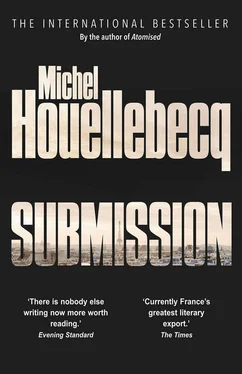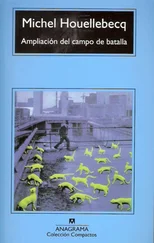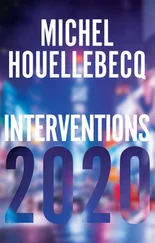‘Avenue de Choisy. Vintage 1970s — an era less well known for its writers, obviously.’
‘That’s Chinatown, isn’t it?’
‘Exactly. Right in the heart of Chinatown.’
He seemed to give this some thought. ‘That may turn out to have been an intelligent choice,’ he said. We had reached the corner of the rue de Clichy. I stopped, transfixed. A hundred metres north of us, Place de Clichy was completely enveloped in flames; we could see the burned-out husks of cars and a bus. The statue of Maréchal Moncey, black and imposing, stood out in the middle of the blaze. There was no one in sight and no sound but the repetitive wail of a siren.
‘How much do you know about the career of Maréchal Moncey?’
‘Not a thing.’
‘He served under Napoleon. He won distinction defending the Clichy barrier against the Russians in 1814 … You know,’ Lempereur continued in the same tone, ‘if the ethnic fighting spreads within Paris itself, the Chinese will stay out of it. Chinatown may become one of the last safe neighbourhoods in the city.’
‘You think that could actually happen?’
He shrugged. At that moment I was amazed to see two riot police in Kevlar, machine guns slung over their shoulders, walking calmly down the rue de Clichy towards Gare Saint-Lazare. They were chatting away, and didn’t give us so much as a glance.
‘They …’ I was dumbstruck. ‘They’re acting as if nothing’s going on.’
‘Indeed.’ Lempereur had stopped and was thoughtfully stroking his chin. ‘At this point, it’s hard to say what is, or isn’t, possible. Anyone who tells you otherwise is either a fool or a liar. I don’t think anyone has any idea what the next few weeks will bring. Well …’ he said, after another pause, ‘my place is up this way. I hope your friend is all right.’
Quiet and deserted, the rue du Cardinal Mercier led to a fountain surrounded by colonnades. On either side stood massive entrances, mounted with surveillance cameras and, behind them, courtyards planted with trees. Lempereur touched his finger to a small aluminium plaque, which must have been a biometric reader: a metal grate rolled open before us. At the end of the courtyard, behind the plane trees, I could just make out a small hôtel particulier , typically Second Empire, cosy and elegant. There was no way he lived here on a teacher’s salary. How did he do it?
For some reason, I’d pictured my young colleague in pared-down, minimalist surroundings, with lots of white. On the contrary, the furniture matched the building exactly. The living room was full of comfortable chairs upholstered in silk and velvet, the tables elaborately inlaid with marquetry and mother-of-pearl. A large, imposing painting, likely an original Bouguereau, hung over an ornate mantelpiece. I sat on a narrow ottoman with bottle-green stripes and was given a glass of pear brandy.
‘If you like, we can try to find out what’s going on,’ he offered, as he handed me the glass.
‘No, I know there won’t be anything on the networks. Maybe on CNN, if you have a dish.’
‘I’ve been trying. There’s nothing on CNN — or YouTube, either. No surprise there. Sometimes they show a few snippets on RuTube, mobile-phone footage mainly, but it’s very hit-and-miss. It’s been days since I’ve been able to find anything.’
‘But why the blackout? I don’t understand what the government is trying to accomplish.’
‘I think they’re terrified the National Front is going to win the election. Any images of urban violence mean more votes for the National Front. So now the far right is stirring things up even more. Of course the guys in the banlieues retaliate, but you’ll notice that every time things have got out of hand these last few months, it started with an anti-Muslim provocation: somebody desecrating a mosque or forcing a woman to lift her veil, that kind of thing.’
‘And you think the National Front is behind all this?’
‘No, no. They can’t do it themselves, that’s not how it works. There are, shall we say, backchannels.’
He finished his brandy and poured us each another glass in silence. The Bouguereau above the fireplace showed five women in a garden, some in white tunics, others half-nude, surrounding a nude infant with curly hair. One of the nude women hid her breasts with her hands. The other couldn’t — she was holding a bouquet of wild flowers. She had lovely breasts, and the artist had executed her drapery to perfection. It was little more than a century old, and that seemed so long ago that at first I felt bewildered by this incomprehensible object. Slowly, gradually, you could imagine your way into the skin of a nineteenth-century bourgeois, one of the frock-coated grandees who had commissioned the painting; you could feel, as they had, erotic stirrings before these Grecian nudes; but it was a hard, laborious climb back into the past. Maupassant, Zola, even Huysmans were much more immediately accessible. I should probably have spoken of that — of the uncanny power of literature — and yet I chose to go on discussing politics. I wanted to know more, and he seemed to know more. At least, that was the impression he gave.
‘I take it you’ve been part of the nativist movement.’ I hit just the right note — that of an interested, merely curious man of the world. I was benevolently neutral. I was dashing. He gave me a big unguarded grin.
‘I knew they’d been talking in the department. Yes, I belonged to a nativist organisation, years ago, when I was writing my dissertation. These nativists were Catholic, in many cases royalists, nostalgics, romantics at heart — most were drunks. Then everything changed, and we fell out of touch. If I went to a meeting now, I doubt I’d recognise anyone there.’
I maintained a tactical silence. When you maintain a tactical silence and look people right in the eye, as if drinking in their words, they talk. People like to be listened to, as every researcher knows — every researcher, every writer, every spy.
‘You see,’ he continued, ‘the so-called nativist bloc was actually anything but. It was divided into various factions, none of which got along with the others. You had Catholics, followers of Bruno Mégret, royalists, neo-pagans, hard-core secularists from the far left … But all that changed when the “Indigenous Europeans” came along. They started out as a direct response to the Indigènes de la République. They had a clear, unifying message: We are the indigenous peoples of Europe, the first occupants of the land. They said, We’re against Muslim occupation — and we’re also against American companies and against the new capitalists from India, China, et cetera, buying up our heritage. They were clever, they quoted Geronimo, Cochise and Sitting Bull. Above all, their website was state of the art. It was really well designed, with catchy music. It brought in new members, younger members.’
‘You think they actually want to start a civil war?’
‘Think? I know. Here, I’ll show you something they put online …’
He got up and went into the other room. Ever since we’d sat down in his apartment, there had been no more sounds of shooting — or else we were out of earshot, in the deep calm of that dead-end street.
He came back and handed me a dozen sheets of paper, stapled together and covered in small print. Sure enough, the headline read: GET READY FOR CIVIL WAR.
‘The Web is full of this kind of thing, but here’s one of the better overviews, with the most reliable statistics. There are lots of numbers, because the article looks at all twenty-two EU member states, but the conclusion is the same in every case. Basically, they argue that belief in a transcendent being conveys a genetic advantage: that couples who follow one of the three religions of the Book and maintain patriarchal values have more children than atheists or agnostics. You see less education among women, less hedonism and individualism. And to a large degree, this belief in transcendence can be passed on genetically. Conversions, or cases where people grow up to reject family values, are statistically insignificant. In the vast majority of cases, people stick with whatever metaphysical system they grow up in. That’s why atheist humanism — the basis of any “pluralist society” — is doomed. Monotheism is on the rise, especially in the Muslim population — and that’s even before you factor in immigration. European nativists start by admitting that, sooner or later, we’ll see a civil war between the Muslims and everybody else. They conclude that, if they want to have a fighting chance, that war had better come as soon as possible — certainly before 2050, preferably sooner if possible …’
Читать дальше







